|
|
|
Sort Order |
|
|
|
Items / Page
|
|
|
|
|
|
|
| Srl | Item |
| 1 |
ID:
138705
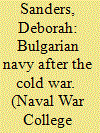

|
|
|
|
|
| Summary/Abstract |
This article examines the Bulgarian government’s struggle to modernize its navy since the end of the Cold War. Although the Bulgarian navy is small, it is an important navy and an interesting case study, for two reasons: it plays an important role in protecting and advancing Bulgaria’s interests in the maritime domain, and it operates in an increasingly challenging maritime nvironment. Situated in the southeastern part of the Balkan Peninsula on the Black Sea, on
which it has a long coastline, Bulgaria has important economic and security interests in the maritime domain, and its navy has a significant part to play in protecting these interests. Bulgaria’s Black Sea ports of Varna and Bourgas are the gateways of 60 percent of the nation’s foreign trade and are vital to its economy. Bulgaria has also become one of the leading tourist destinations in Europe.
|
|
|
|
|
|
|
|
|
|
|
|
|
|
|
|
| 2 |
ID:
162736
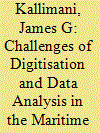

|
|
|
|
|
| Summary/Abstract |
The volume of collected and synthesised data available to governmental leaders assessing the maritime domain has increased rapidly over recent years. Analogue data has given way to digital data, which provides an opportunity for better storage, analysis and transfer. Data infusion and management has become the key constraint in respect of data collection. Using data to make decisions requires the appropriate tools and processes to assess and transfer data to near real-time user domains. In the maritime environment, there is a constantly growing demand for intelligence, surveillance and reconnaissance (ISR) data for both national security and commercial purposes, including data sharing among partner nations. However, an increase in available data does not automatically equate to an increase in decision-ready information. Rather, the increase in data can overwhelm sensors, databases and analysts. The concept and use of “big data” exacerbate the already overwhelming flow of data in terms of the volume, variety, and velocity of the data being received. This paper will explore the digitisation of the maritime domain, and the prospect of performing data analysis in a world of rapidly growing data.
|
|
|
|
|
|
|
|
|
|
|
|
|
|
|
|
| 3 |
ID:
139594
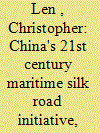

|
|
|
|
|
| Summary/Abstract |
In recent years, the Chinese leadership has increasingly turned its attention towards the maritime domain. This article discusses Beijing's latest attempts to secure China's maritime energy supply chain across the Indian Ocean region and the South China Sea through which the majority of its seaborne energy imports transit. As China increasingly relies on the seaborne energy trade, Beijing has come to attach more importance to the security of the sea lines of communication (SLOCs) and has a growing strategic interest in ensuring unimpeded access in these two areas. In this paper, the author discusses Beijing's efforts in the context of China's maritime power aspirations, particularly the 21st Century Maritime Silk Road initiative which is promoted by the current Chinese President, Xi Jinping. The author argues that Beijing's latest maritime agenda will be hampered by the strategic distrust and political risks China faces in the Asian region.
|
|
|
|
|
|
|
|
|
|
|
|
|
|
|
|
| 4 |
ID:
133060
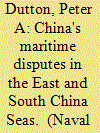

|
|
|
|
|
| Publication |
2014.
|
| Summary/Abstract |
China pursues its security through interior strategies that involve the development of rings of security around central areas of national interest. The Chinese have long felt vulnerable from the sea, and their current maritime strategy seeks to reduce that vulnerability by extending a ring of maritime control around China's periphery. China pursues this control through a combination of forcestructure development and legal assertions. Tensions arise because China's strategy conflicts with the territorial claims, resource interests, and security concerns of other states in East Asia. China's strategy also causes friction with the United States, which relies on freedom of navigation in maritime East Asia for American security interests and which must reassure regional allies and partners that American security guarantees are meaningful. In order to ensure the position of the United States in East Asia, American policies must focus on maintaining the region as an open, maritime system. This requires continuous development of technological advantages to ensure that the center of power in Asia does not migrate from the maritime domain to the continent. It also requires the United States to support the ability of allies, friends, and partners to resist China's nonmilitarized coercion, as well as to reinforce the normative structure that supports the efficacy of maritime power in the region and around the globe.
|
|
|
|
|
|
|
|
|
|
|
|
|
|
|
|
| 5 |
ID:
133071


|
|
|
|
|
| Publication |
2014.
|
| Summary/Abstract |
It has been well over a decade since the first “prophets” of information warfare proclaimed a new age of conflict fought not just on air, sea, and land but with electrons in what came to be known as “cyberspace.”1 Since these early predictions, many incidents have confirmed that criminals, random hackers, and government-sanctioned specialists can wreak havoc on governments, military communications systems, and corporations. The Stuxnet worm alone helped delay-by months, perhaps years-the long-standing efforts of Iran to acquire sufficient nuclear material to build nuclear weapons.2 Recent revelations of hacking campaigns against such publications as the Wall Street Journal and New York Times have broadened concerns to include even the integrity of American democratic institutions.3 Meanwhile, the commander of U.S. Cyber Command has characterized cyber attacks designed to gain access to the intellectual property of American corporations as the “greatest transfer of wealth in human history.”
|
|
|
|
|
|
|
|
|
|
|
|
|
|
|
|
| 6 |
ID:
138238
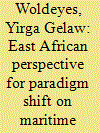

|
|
|
|
|
| Summary/Abstract |
This paper advances the view that the meaning of maritime security should be considered based on lessons of history and requirements of human well-being. It challenges the tendency to separately view maritime security from the political, economic and social structures of the East African littoral states. Based on a critical reading of the history of the development of violent colonial structures in the region, the paper shows that most security discourses in relation to East Africa advance a paradigm that legitimises the control and management of the region’s maritime domain under the surveillance of foreign powers. The framing of poverty and conflicts as internally caused and economically motivated power struggles within fragile states contributes to this paradigm. This paper argues that the East African maritime domain is an integral part of the hinterland, and maritime security should be understood from a perspective that addresses structural violence in the region.
|
|
|
|
|
|
|
|
|
|
|
|
|
|
|
|
| 7 |
ID:
133677


|
|
|
|
|
| Publication |
2014.
|
| Summary/Abstract |
Growing concerns about the slow revival of the world economy, volatility in oil prices, overcapacity in shipping and fierce competition is denting profits in the shipping industry. On the other hand, emergence of greenhouse gas emissions and pollution control regimes at sea is forcing ship owners to make expensive technical modifications onboard ships, which are further driving up the costs of operations. In such a rapidly changing scenario, there is a need for a long-term vision for transitioning to an era of sustainability in the international shipping industry. The paper commences with a discussion on the concept of sustainability as applicable to the shipping industry and highlights the recent developments in the maritime domain, which pose significant environmental and economic challenges for the shipping industry. It identifies the emerging trends in the shipping industry and argues that these challenges also present a window of opportunity for the industry, for undertaking a paradigm shift towards sustainable shipping. It further explores the transition pathways and presents various options that can be implemented in the shipping industry, which will aid its transition towards sustainability. Using a case study, the paper highlights the key characteristics of sustainable shipping and briefly discusses the Indian maritime scene before concluding that the adaptability of the world shipping industry to adopt the practices of sustainability is fundamental to its survivability in forthcoming decades.
|
|
|
|
|
|
|
|
|
|
|
|
|
|
|
|
| 8 |
ID:
150276
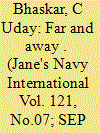

|
|
|
| 9 |
ID:
130397
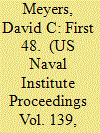

|
|
|
| 10 |
ID:
137623
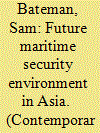

|
|
|
|
|
| Summary/Abstract |
This article adopts a risk assessment approach identifying the maritime threats and challenges that might confront Asia over the next decade. It addresses the evolving strategic environment, shifts in the maritime balance of power and the likelihood and impact of particular threats in the maritime domain. Issues considered include: the consequences of maritime sovereignty disputes; developments in regional naval forces; increased exploitation of marine resources, both living and non-living; and trends in illegal activity at sea. Three scenarios for the future maritime security environment are identified along with the possibility of “strategic shocks” that reflect inherent uncertainty in attempting predictions of the future. The paper concludes with possible measures to mitigate the risks of the threats
|
|
|
|
|
|
|
|
|
|
|
|
|
|
|
|
| 11 |
ID:
130878
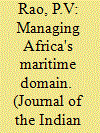

|
|
|
|
|
| Publication |
2014.
|
| Summary/Abstract |
Africa's coastal zones and ocean spaces bear certain unique features as different from those of the other zones of the Indian Ocean region. One such maritime characteristic is that the continent is virtually flanked by sea on all four sides. Such uniqueness of the region has both positive and negative consequences for the coastal countries of Africa. The adverse consequences of the maritime topography, such as piracy and illegal fishing, are rather more seriously felt by today by the regional states. The unstable and fragile political regimes of many of the African littoral countries compound the problems of managing their maritime domains. Maritime criminal and illegal operations are confined not only to the coastal states but also to the island states of the continent. The inability of these states to combat the threats regularly posed by maritime non-state actors has resulted in the enormous naval militarisation of the African waters by foreign naval forces, Western and non-Western. How far and how long the states of the region should depend on foreign countries for ensuring the safety of their coastal zones will also determine the level of independence that these states will retain to keep their maritime wealth and domain under their sovereign control.
|
|
|
|
|
|
|
|
|
|
|
|
|
|
|
|
| 12 |
ID:
147057
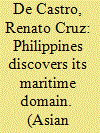

|
|
|
|
|
| Summary/Abstract |
With China’s naval expansion in the South China Sea, the Philippine government has eased up its counter-insurgency/counter-terrorism campaign and has vigorously pursued instead the modernization of the Armed Forces of the Philippines (AFP) particularly in developing the deterrence capability of the Philippine Navy (PN). However, slow-paced and hampered by scant resources, the naval build-up will hardly deter China’s encroachment on the Philippine maritime territory. Faced with this predicament, the Philippines has resorted to forging new security partnerships with the United States and Japan, two major naval powers in East Asia. The paper concludes that maritime security will remain the Philippines’ priority concern way into the third decade of the 21st century.
|
|
|
|
|
|
|
|
|
|
|
|
|
|
|
|
| 13 |
ID:
130059
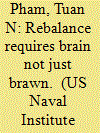

|
|
|
|
|
| Publication |
2014.
|
| Summary/Abstract |
The U.S. Navy needs a comprehensive, cost-effective, and sustainable plan to develop and deploy more regional experts to the Asia-Pacific region.
The Navy is at the forefront of the U.S. rebalance toward the Asia-Pacific region, a fundamentally maritime domain with contested global commons. This "pivot" builds on decades of a strong regional presence and long-standing alliances and partnerships with countries in the vicinity. To be effective, however, the rebalance must incorporate "brains" in addition to "brawn." While the Navy has strengthened its presence in the Pacific by increasing its rotational force deployments, basing more ships and aircraft forward, and fielding new capabilities, its efforts to enhance its intellectual capital are still underreported, under-resourced, and too often undervalued. But this is beginning to change, due in large part to the efforts of the staff of the Office of the Chief of Naval Operations.
|
|
|
|
|
|
|
|
|
|
|
|
|
|
|
|
| 14 |
ID:
132086
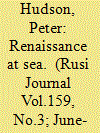

|
|
|
|
|
| Publication |
2014.
|
| Summary/Abstract |
When Allied leaders gather in Wales to discuss NATO's future strategy, one of the factors they will take into consideration is the maritime domain. Peter Hudson argues that maritime forces can make a significant contribution to Alliance security and to the achievement of NATO's future strategic goals.
|
|
|
|
|
|
|
|
|
|
|
|
|
|
|
|
| 15 |
ID:
097585
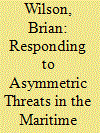

|
|
|
|
|
| Publication |
2010.
|
| Summary/Abstract |
Tension on the high seas between lawful commerce and illicit activity has existed for thousands of years, but today it represents a particularly serious challenge that requires more than just power projection; it requires innovative diplomacy, regional commitments, dedicated leadership and increased legal authority. In the maritime domain, there is no greater area of concern than asymmetric threats. Cooperation has unfolded to address some of these challenges, but states and international venues have yet to holistically confront the myriad threats emanating from the oceans. The desired result of every maritime attack may not necessarily be a judicial proceeding, but the ability and political will to prosecute is a critical factor in ensuring a safer maritime environment. When gaps in the law exist-whether in the area of illicit cargo, container security, underwater explosive devices or attacks in shipping channels-criminals and terrorists can operate with impunity. To address these gaps, states can better position themselves by strengthening the law, prioritising political and operational support, removing sanctuaries and authorising the pursuit of illicit assets.
|
|
|
|
|
|
|
|
|
|
|
|
|
|
|
|
| 16 |
ID:
143741
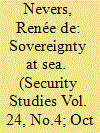

|
|
|
|
|
| Summary/Abstract |
The oceans present a variety of perils to both states and private actors, ranging from smuggling to direct attacks on vessels. Yet, a disconnect exists between states’ maritime power and sovereign fleets due to the emergence of open shipping registries in the 20th century. How have great powers like the United States responded to threats generated by transit of the oceans for legitimate and illicit purposes? The nature of peacetime security threats that states confront at sea has shaped divergent responses. The main maritime powers draw a distinction between threats aimed at states and threats to commerce. Where perceived threats to the state are concerned, great powers have sought to revise understandings of the protections sovereignty provides—specifically, by seeking expanded interdiction rights—to further their own security goals. When maritime powers perceive that international commerce is under threat, they delegate the sovereign protection function both upward to internationally sanctioned maritime coalitions and outward to private security firms. These policies are responses to the security challenges that result from the decoupling of sovereign power and the merchant fleet that followed the emergence of open shipping registries.
|
|
|
|
|
|
|
|
|
|
|
|
|
|
|
|
| 17 |
ID:
151689
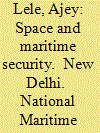

|
|
|
|
|
| Publication |
New Delhi, National Maritime Foundation, 2017.
|
| Description |
v, 91p.pbk
|
| Series |
Monograph Series
|
| Standard Number |
9788193299838
|
|
|
|
|
|
|
|
|
|
|
|
Copies: C:1/I:0,R:0,Q:0
Circulation
| Accession# | Call# | Current Location | Status | Policy | Location |
| 058965 | 358.80954/LEL 058965 | Main | On Shelf | General | |
|
|
|
|
| 18 |
ID:
129186
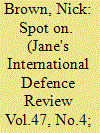

|
|
|
|
|
| Publication |
2014.
|
| Summary/Abstract |
Once considered inappropriate for the challenging environmental conditions encountered at sea, laser guided weapons are now increasingly being promoted for precision attack in the maritime domain. Nick Brown scouts out what has changed.
|
|
|
|
|
|
|
|
|
|
|
|
|
|
|
|
| 19 |
ID:
129853
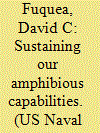

|
|
|
|
|
| Publication |
2014.
|
| Summary/Abstract |
Scrap the 30-year shipbuilding plan. The US navy must adopt a realistic, cost effective blueprint to ensure a viable ship-to-shore movement capacity in the future.
|
|
|
|
|
|
|
|
|
|
|
|
|
|
|
|
| 20 |
ID:
133072


|
|
|
|
|
| Publication |
2014.
|
| Summary/Abstract |
For the secretary-general of the United Nations, Ban Ki-moon, contemporary piracy is nothing less than a "global menace." There are several piracy "hot spots" the world over, each with its own dynamics, but it is Somali piracy that in recent years has particularly caught the attention and raised the ire of states, shippers, and international organizations. International Maritime Organization (IMO) statistics reflect the quantitative dominance of Somali piracy. In 2010 and 2011, the number of alleged attacks in international waters off East Africa and on the Indian Ocean (into which Somali pirates now venture) was 84 percent of the global totals in each year. In 2012, owing to developments both on land and at sea, the Somali weighting declined, but it was still a considerable 54 percent of global totals.
|
|
|
|
|
|
|
|
|
|
|
|
|
|
|
|
|
|
|
|
|